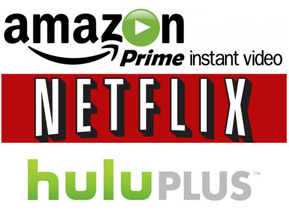Intermittent Issues: I, For One, Welcome Our New Binary Overlords
By Ben Gruchow
November 10, 2016
Far more intriguing was the ascent and [re]establishment of Hulu, which is pretty much Ground Zero for streaming current seasons of TV shows. Hulu started life as a personal blog in the late 1990s, stylized as HuLu and operated by a private citizen as her personal photo-sharing website. Looking at HuLu as it existed in this context is like jumping in a time machine and going back to 1998 and the days of Geocities and Yahoo! web pages: a text-based list of links to various photo galleries, in Times New Roman font with no real graphical elements. HuLu operated in this regard from 1999 until summer of 2007; at this point, the site went “dark” without any explanation.
The development was the final move in a series of negotiations between six industry executives that had begun in spring of 2006, not long after “Lazy Sunday” had made the rounds on YouTube and established the Content Guidelines; the venture was a video streaming service, this one sanctioned by production companies. The re-branded Hulu launched in August of 2007, consisting of nothing more than an invite to sign up by e-mail for the beta, promised in October. When that day arrived, the initial offerings involved premiere episodes from initial partners NBC and Fox.
Hulu was something of a game changer even in this early form: the quality was significantly improved over YouTube, and available in widescreen HD. The presence of extremely short commercial breaks - no more than 30 seconds to begin with, and often limited to a single 15-second advertisement - gave the enterprise the distinct feeling of a giveaway. The fact that this launch took place against a looming writer’s strike, predicated on the challenge of adequately compensating creators for their content against the rise of “new media” (i.e. digitally-delivered content) provided some grim irony, but only for those really looking for it in the first place.
It did not take long at all for Hulu to begin expanding both its content and its barrier to entry; TV shows from ABC and certain cable networks began to find their way online. The CW and Comedy Central also came onboard, albeit by way of portals to the network’s own sites. The tradeoff was that the commercial count and duration expanded, from 30 seconds to 60, then to 90. Hulu Plus also became an offering, exchanging a flat monthly fee for expanded episode access (the free-access version of the site had its current episode roster quickly capped at the previous five episodes in the relevant season) and no commercials. If this and the four other content providers we’ll cover for the remainder of this column fall into a certain niche, Hulu’s is that of the individual who consumes TV shows by volume, on a daily basis.
Video and audio quality rank somewhere near the bottom of the pack; although Hulu offers content in HD with H.264, it maxes out at 720p, and it uses Flash instead of HTML5 for its delivery. Hulu cited DRM and compatibility with iOS devices for this decision; this is something that is more applicable in 2010 than 2016. Audio is spottier; by taking a peek at the Hulu Advertising guidelines, audio can only be submitted in 2-channel stereo, at 192 kbps. This works well enough for TV shows, but underwhelmingly so for feature films. And the audio on Hulu’s trailer and promotional materials is disastrous; the source file contains clear instances of EQ being applied to all of the original surround channels, including low-frequency effects. The result is a muddy sound that leads one to believe that they’ve blown out their subwoofer or speakers even at moderate volume levels. This is ancillary, though; the viewer who uses Hulu for all of their streaming-media needs is unlikely to notice much of that compromise.
Continued:
1
2
3
4
5
6
7




